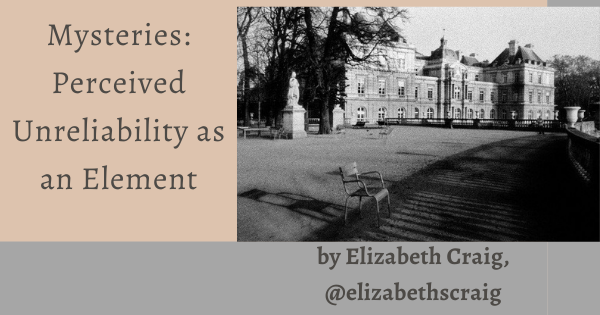by Elizabeth S. Craig, @elizabethscraig
I started reading the cozy mystery master Agatha Christie at a very impressionable age and loved the construction of her books and the characters she created.
There were a couple of elements of her books that especially stuck with me and they both involved unreliability of characters. Reliability, or perceived unreliability, can have a big role in mysteries.
Seemingly Unreliable Sleuths
Agatha Christie was a master at creating sleuths that could be easily underestimated. Miss Marple might come immediately to mind, but she intended her brilliant Hercule Poirot to be, as well…he could behave cartoonish at times and was considered a foreigner by other characters.
These unreliable, easily underestimated sleuths had the ability to fly under the radar. Instead of putting suspects on their guard, they tended to either lull them into confidences (Miss Marple) or just often not seem intimidating at all (Poirot). Suspects then could accidentally drop clues that might point to the murderer or provide gossip that could help better fill in a picture of other suspects.
Seemingly Unreliable Witnesses
This was another element Agatha Christie used in her mysteries. Often there was a character who the other characters would sort of roll their eyes over. They might seem scatterbrained or flighty or hesitant. They would offer a clue or some bit of information that everyone would discount because of who provided it. Unfortunately for the character, they’d usually get murdered because the killer would realize they did know something vital. The character would be eliminated before he or she could offer any other information.
These elements are still useful for mysteries today and provide great ways to uncover more clues in the story. As a reader, do you recognize these seemingly unreliable characters? If you’re a mystery writer, have you used them (I have)?
Perceived Unreliability as an Element in Mysteries: Share on XPhoto on Visualhunt.com

Hi Elizabeth – much of my reading as I grew up was of the mystery type from all sorts of authors around the world. Those who succeed have wonderful careers. It’s interesting watching mysteries being made into tv programmes and even years later watching very early made ones – they still work, especially with charismatic characters being portrayed by perfect-choiced actors/actresses.
You’ve certainly mastered your various cozy mysteries … and have developed lots of followers and friends. Congratulations. Cheers Hilary
Aren’t they fun books? And you’re right–we can armchair-travel to so many different places around the world. Hope you’re doing well, Hilary!
I probably don’t use or recognize unreliable characters as well as I should.
They can be really helpful for a story!
I haven’t read many cozy mysteries. Just starting to read them, but I will watch out for these characteristics when reading them. I’ll be curious to see if you use these techniques in your mysteries.
My Myrtle sleuth (an octogenarian) is always considered unreliable by suspects. :) They tell her all sorts of things they shouldn’t!
Excellent insights, Elizabeth. Since reading your post, I’ve been mentally reviewing a few of the mysteries I’ve read and you’re on target! 😊
Thanks, Gwen! It’s a fun element to use in a mystery
My daughter and I were just talking about Agatha Christie the other day – and this came up. Poirot often exaggerated himself in some way to lull the others. I haven’t consciously done this, but I think I do have a couple of sharp-eyed folks dressed up in softer outsides. Interesting!
I think it’s an element that could add a little intrigue to several different genres! Agatha Christie was a master at it.
Clear and useful, Elizabeth. Thank you. I wonder whether you’ve considered extending the idea of unreliability by writing about narrators? It’s always been fascinating to me how some first-person narrators reveal themselves to be lying to themselves. The writer’s job is to reveal this self-deception to the reader, who then gets to watch the storyteller reveal herself/himself in this special way.
Excellent point, Barry! Unreliable narrators can be a great addition to a mystery. (“The Murder of Roger Ackroyd” comes to mind.) Thanks for coming by!
I don’t have enough writing experience to use unreliable characters yet. I’m still working on trying to make my characters seem real and reliable in the first place. Unreliable characters will be when I reach the next level of my writing.
Good point on not putting the cart before the horse, Ken!
I read this after you posted it on FB, but I guess I didn’t comment. Ugh! This is another article I’ve saved. I love your observations on Christie’s writing and her genus. Thanks for interesting and helpful posts!
She’s been a big influence on me! Thanks so much for coming by, Teresa!
Oh Elizabeth – a favourite of mine as well. Because, I believe, we are all unreliable. We don’t know what we saw or heard separate from our feelings. You’ve just given me an idea! I’d like to write about the first robot detective. Wouldn’t that be fun? I think my protagonist, Nell Munro, falls under the slightly unreliable protagonist. She is so consumed with her passions sometimes (protecting vulnerable youth mainly) that she fails to be as unbiased as she should be. But hey – that’s what makes it a story for me. I do wish Hercule Poirot had failed a few more times though. Thanks for this great post!
An excellent point! We’re all decidedly unreliable. I’d like to read about a robot detective. :) Nell sounds like a great protagonist. And I’m with you on Poirot needing to have a few more failures! Hope you’re doing well, Jan.